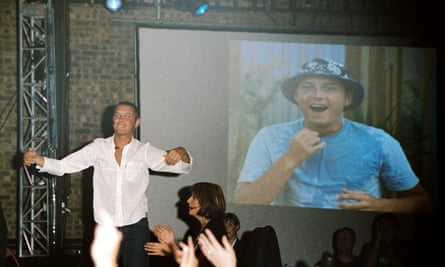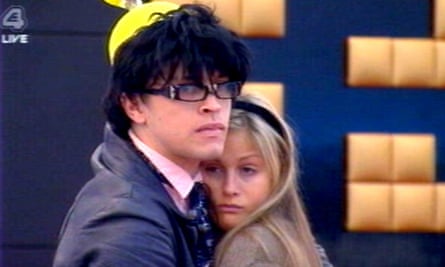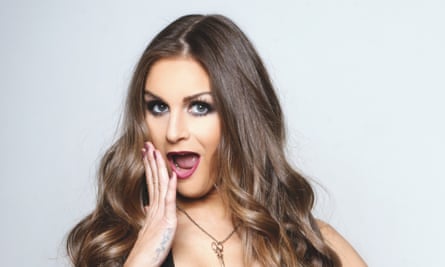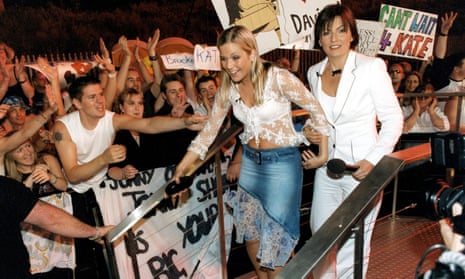On 18 July 2000, 10 people entered a custom-built studio in a lot in east London. They were taking part in what was being billed as a unique “social experiment”: the opportunity to watch ordinary people on our screens, day-in, day-out.
No one could have known then the influence Big Brother would have on our viewing habits, or how it would birth the genre of reality TV in the UK. At the time, it was just another gameshow. But over the next 19 series – and 22 celebrity spin-off series – it redefined the nature of entertainment and modern celebrity. Thanks in part to the concomitant rise of tabloid magazines including Closer and Heat, with their endless appetite for celebrity gossip, the housemates, who entered the Big Brother house as nobodies, left as stars. In its heyday, Big Brother was a ratings goliath: the season three finale reached 10 million viewers. Housemates such as the late Jade Goody became cultural icons, while the likes of Alison Hammond and Brian Dowling became broadcasting mainstays in their own right.
But sudden celebrity did not work out for all the contestants. When Goody re-entered Celebrity Big Brother in 2007, she became embroiled in a racism scandal that nearly ended her career. Other housemates struggled to adapt to life after Big Brother, particularly when the next crop of housemates entered the show and opportunities dried up. Speaking to the Guardian in 2005, the former contestant Makosi Musambasi expressed regret for having sex on the show; she has since spoken about needing to “recalibrate myself separately from what Britain defined me as: the black girl with the big boobs”. Later seasons of Big Brother became noted for their cruelty, as producers threw opinionated personalities in the house in the hope that the inevitable conflicts would spell ratings gold.
For all of its controversies, however, it changed TV for ever and remains the ultimate time capsule of 00s life. Twenty years on, as it returns to screens for a series of “greatest hits” episodes, some of the show’s most famous housemates reflect on how it changed their lives – and what came after Big Brother.
Craig Phillips, winner of series one in 2000
I never told anyone about this on the show, because I wanted to win it fairly, but I applied for Big Brother because I wanted to raise money for my friend Joanne, who needed a heart and lung transplant. The NHS had rejected her, because she had Down’s syndrome. We had been fundraising to fly her to the US for treatment, but we didn’t have enough money. I figured that, if I went on Big Brother, maybe someone could write a newspaper article about her and it would help us raise the money. When the producers called me, I was on a rooftop, doing some lead flashing around a chimney breast. I said: “Endemol who? Let me get off this roof and I’ll call you back.”
When you’re in there, you have no idea how you’re being portrayed. This was season one, remember, so we didn’t know if anyone was even watching. The turning point for me was definitely the confrontation with “Nasty Nick” [Nick Bateman]. He’d been showing everyone notes, telling them who to nominate, and we all knew he was doing it. Everyone was getting quite aggressive, so I calmed everyone down and said: “Let’s have an adult conversation, let’s keep it calm and let Nick have his say.” Viewers liked me after that, because Nick was the most educated, poshest person in the house and I had the worst education out of anyone in there. But I outsmarted him. People liked it, because the underdog won.

Coming out of the house was surreal. I get goosebumps just thinking about it. More than 10 million people were watching the show. After the final, I got bundled into a people carrier with all these bodyguards and a police escort and rushed out of the studio. There were press on our tail. They took me to a hotel where there was a therapist waiting for me. He said: “Tomorrow you’re going to be the most talked-about person in Britain. How does that make you feel?”
I never had any ambitions to work in TV. I thought I would be back on the building site on Monday morning. I couldn’t have been more wrong. I had six bodyguards chaperoning me. I didn’t go home for 97 days. I changed hotels every day – sometimes more than once a day. I’d do TV chatshows, radio shows, personal appearances, awards ceremonies. Sometimes I’d get a private helicopter from one gig to another.
I was quite business-savvy and I wanted to succeed. I was making serious money from personal appearances and agents were lining me up for production jobs. I thought: I’m a builder, why not do building work on television? TV has highs and lows, so whenever I wasn’t working I’d go back to construction. I think I’ve done more than 1,000 TV makeover shows.
Big Brother gave me a great lifestyle. I have no complaints – it really worked out for me.
Brian Dowling, winner of series two in 2001 and Ultimate Big Brother in 2010
I was a 22-year-old Ryanair steward when I went into the house. I had no idea that, 19 years later, I’d still be working in television. I was only on that show for nine weeks. But it opened so many doors for me. Everything in my life that has happened since has happened because of Big Brother.
When you’re in there, there are moments when you do forget about the camera. That’s the genius of Big Brother. We’re all nosy – we love to see what’s going on in other people’s lives. If my neighbours are having an argument, I’m the first person to lean over the fence to listen. Big Brother was the first show to encourage voyeurism, but it made it public, so there was no shame attached to it. Anyone could do it.
Back then, the show wasn’t so produced. You only did one task a week. Going into the house, I made a decision that I wasn’t going to get drawn into bullshit arguments that didn’t mean anything. I was going to have a good time – and I did.
The opportunities I got after I left the house were incredible. You have to remember, I was from a rural town in Ireland. I’d never even eaten Indian food before Big Brother. I had my first curry on the show. I was one of seven, from a very working-class family. Big Brother gave me the opportunity to go above and beyond what a lot of people ever predicted for me.

Back then, executives were more open to giving people like me opportunities. When I got the job on SMTV with Cat Deeley, it was like a dream for me. To be an openly gay children’s TV host back then was a big deal. Doing SMTV for two years also kept me on the straight and narrow. I was learning how to host live TV on the job, and because I had to wake up early I couldn’t go out and party. I stopped being a reality TV star, which has a shelf life, and became a presenter.
Going back into Ultimate Big Brother, I was nervous. I had a good career; I had a lot to lose. I saw what happened when Jade went back into the house and how that worked out for her. Also, by then, reality TV had changed. The producers wanted more drama, more confrontation. Winning Ultimate Big Brother was amazing. I was never up for nomination on either show. I went straight through to the finals. I was like: wow, that doesn’t normally happen. I was very thankful.
Kate Lawler, winner of series three in 2002
I remember being on a train just before I went into the house and seeing peoplereading articles about the new series of Big Brother. By then, it was a national obsession. People talked about it constantly. I knew what I was getting myself into, but I didn’t anticipate how successful the show would be.
It’s hard to remember what the house was actually like – first because it was 18 years ago, but also because we drank so much alcohol while we were in there. The producers genuinely did not limit how much alcohol we were drinking, which looking back is kind of irresponsible, but at the time it wasn’t seen that way. They just plied us with alcohol and watched what happened.
Leaving the house as the first female winner, I was selective about what I chose. You get offered so much stuff. One newspaper wanted to pay for me to get a boob job, so I could get them out on the front page. I said: “No thank you, that’s not for me.” I was offered a part in the touring edition of Summer Holiday: The Musical. I can’t even sing! I told them: “I think it’s in everyone’s interests that I don’t take part.”

The trick to having a successful post-Big Brother career is partly luck and partly hard work. I did [Channel 4’s breakfast TV show] RI:SE, which was great. Then I did a TV show [on ITV] called Celebrity Wrestling, which I loved, but the ratings weren’t good. All these TV shows that I loved, which I thought might get me my own TV show, didn’t work out. I disappeared from TV for a few years, because the opportunities just weren’t there. I learned to DJ instead and had great fun doing that for a few years – it was very hedonistic – and then I moved into radio. I love music and talking, so it’s my dream job.
What was frustrating about life after Big Brother was that everyone wanted to define how successful you were based on how much you appeared on TV afterwards. But some contestants wanted to go back to their normal lives. Not everyone wanted to be on TV for ever and be like Jade Goody. There was only ever one Jade Goody. You’d read all these articles that said: “What are the winners doing now?” and it would feel demoralising.
For years, I didn’t really talk about Big Brother. I was cracking on with my career. But, as time has gone on, I’ve realised how huge the show was. Now, I look back at it with affection and nostalgia.
Pete Bennett, winner of series seven in 2006
People still get a right buzz off me: they see me in a club or on the street and lose their minds. I’m always nice to them. I would never say no to someone wanting a selfie.
I think I was popular because I called everyone a wanker, but also because I had good morals. I knew that I had a big impact in teaching people about Tourette’s and people who were different. But I didn’t realise I had an impact in teaching boys not to be sleazy, until someone got in touch with me recently. I taught him how to treat women with respect. When I was in the house, [one of the male contestants] used to grab the girl’s bums. I was always complaining about him, saying it wasn’t right that he was so lechy.
After I left Big Brother, all the kids would copy me. They’d do their hair in a mohican or shout: “Wankers!” It’s mad looking back at it now. I was the most famous man in Britain at one point. But then the next season of the show came out and Brian Belo was on. He was such a funny guy. I’d been the main funny man until then. I would have loved to have continued being on the TV; I loved making people laugh, it gave me such a buzz. When no one was putting me on the television anymore, it was a bitter pill to swallow. It made me feel a bit funny.

When Ultimate Big Brother came around in 2010, I was in a really dark place. My best friend had just died. So I thought: amazing, this will be my chance to make people laugh again. Also, I really need to pay some bills. The producers told me that I was the most popular housemate ever and that they’d love to have me back as a contestant. A week before I was meant to go into the house, they called me up and dropped me.
They never gave me a reason why. Maybe they were scared I was going to win too easily. Or I wasn’t argumentative enough. Or maybe it was my Tourette’s – maybe they couldn’t afford the man who pushes all the buttons to censor my swear words. I don’t know. I felt a bit lost. I didn’t know where I belonged any more. I forgot who I was for a bit – I was aggy and weird. That’s why I thought I’d get on with my own thing. I make comedy videos now and I still get to make people laugh. I don’t need Big Brother any more. I don’t even have a mohawk. I’ve let all the old Pete shit go. I’ve let everything go.
Nikki Grahame, contestant in series seven in 2006 and runner-up of Ultimate Big Brother in 2010
I hold fond memories of Big Brother, even though there were times where it looked like I was having a meltdown. Those meltdowns really were me, though. What you see has always been what you get – I can’t be any other way.
When you’re in the show, it’s like you’re in a bubble. You forget the outside world exists at all. When you come out, it’s crazy. It was a whirlwind. My feet didn’t touch the ground for six months. It was just back to back with work. I’d be getting up at 6am to do Radio 1, filming [her reality TV show] Princess Nikki all day, doing a photoshoot, getting in a car, driving to Brighton and doing a club appearance until 1am in the morning. My days were like that for six months solidly. You run on adrenaline.
It was pure excitement. Every day was so exciting and new. I was in the same magazines as Kate Moss. I got lovely freebies: clothes, beauty products, stays in spas, all kinds of luxuries.
I always enjoyed watching the next generation of housemates come into the show. I’d see them throwing tantrums or having showmances and think: they’re copying me. It never bothered me, watching the public fall for the new contestants, because I knew they would always have a love for their favourite characters – and I was fortunate enough to be one.
Sometimes it was hard, though. When I was struggling in the past with personal issues, you would always have the press picking up on it and writing about it [the media wrote extensively about Grahame’s mental health]. Sometimes, when I was going through a tough time, it was hard to put on a smile when I got recognised in the street, or have to go on stage and be all happy-clappy. But the positives outweighed the negatives.

Doing Ultimate Big Brother was really sad, because it was the last ever show [on Channel 4]. It was weird being in there with the celebrities. Some of them were awful, like Coolio and Ulrika Johnson. Coolio was a bully and Ulrika was so negative about everything. But Vanessa Feltz was lovely.
Financially, Big Brother gave me a lot. I bought the flat I live in now. I’ve never had to get a “normal” job; I’ve always had something to fall back on. There has always been work coming in, whether it’s nightclub appearances or the panto or magazine columns or TV panel shows. I’ve been very lucky. Overall, it has had a positive effect on my life.
Big Brother: Best Shows Ever begins on E4 on 14 June

Comments (…)
Sign in or create your Guardian account to join the discussion